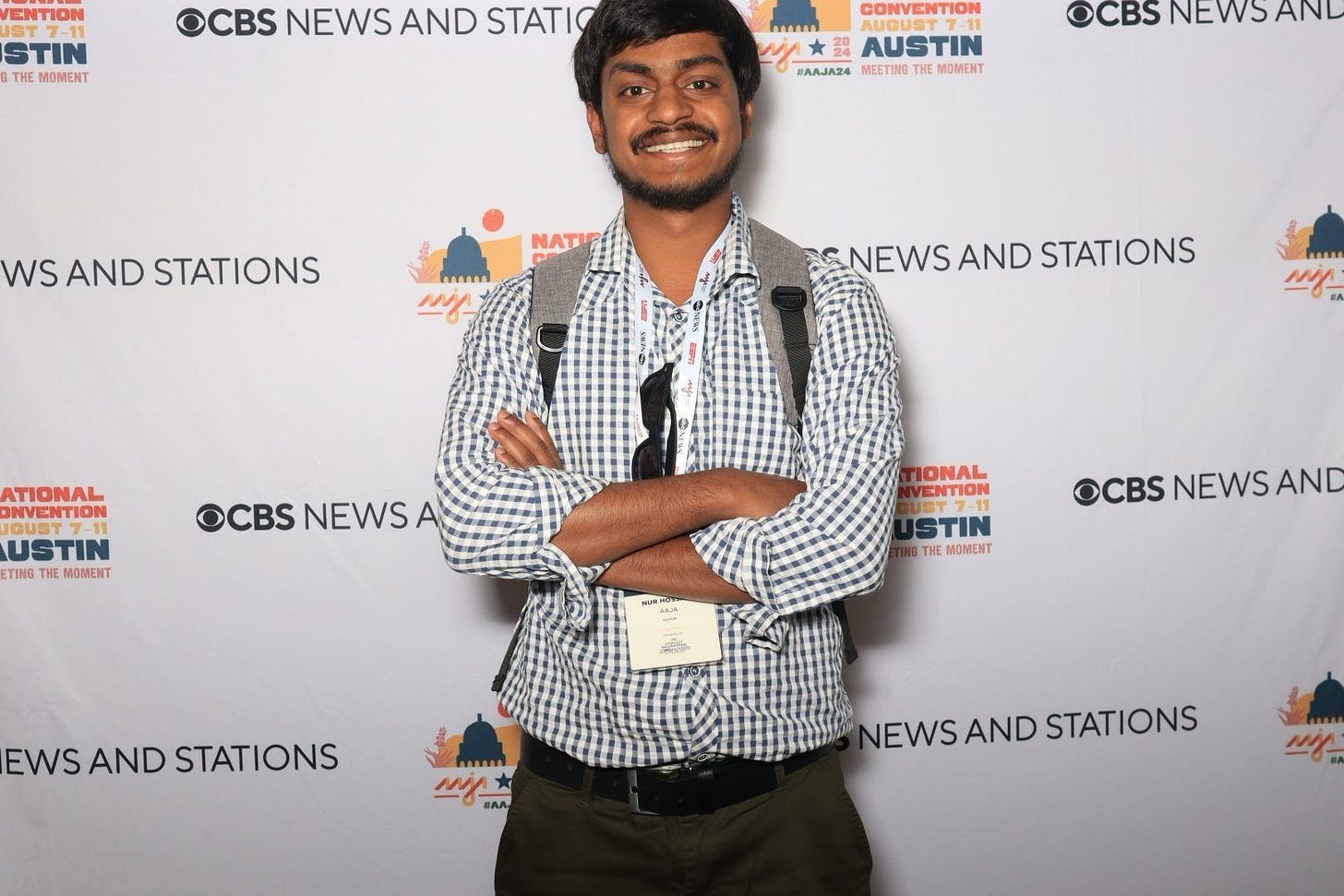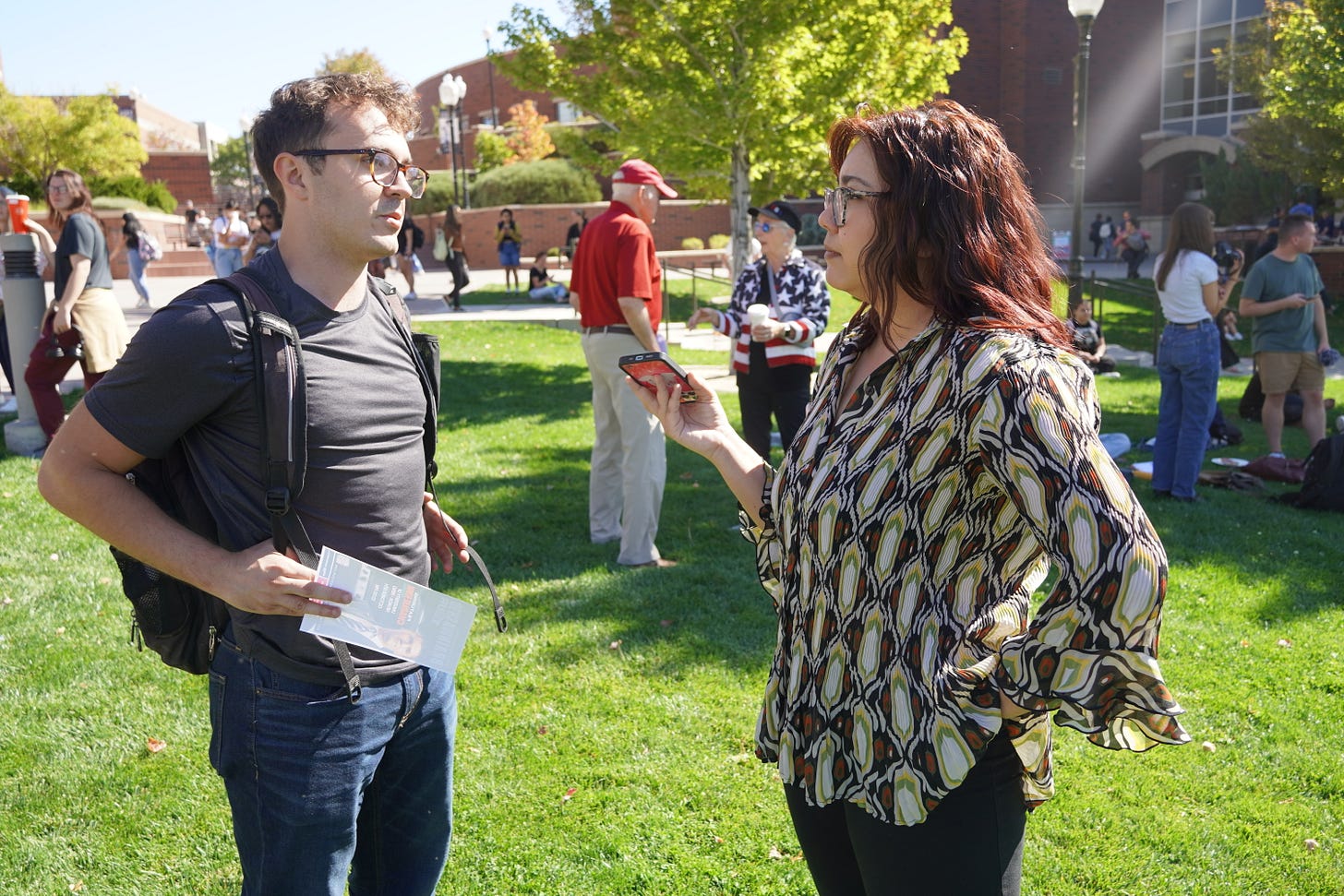Covering US elections brings Bangladeshi student journalist to tears
Inside Nevada Vote, an election reporting class in a swing county

Nur Hossain had a defining moment covering Nevada’s primaries for the Associated Press earlier this year.
Watching officials count ballots and update journalists in real time, he saw the transparency he longed for in his own country.
He said he cried. He felt it was the best moment of his life.
“I always dreamed of watching something like this in my country,” said the international student journalist from Bangladesh. “This is the democracy we want. Everything will be transparent. Everything will happen before journalists because they are the spokespeople of the people.”
Hossain is one of 14 in Nevada Vote, an election reporting class that sends student reporters to cover swing Washoe County — potentially decisive in the White House race — where their university, the University of Nevada, Reno, is located.
The class has covered various events, including conservative activist Charlie Kirk’s campus visit and Minnesota Gov. Tim Walz’s campaign stop, publishing in-depth pieces about local races and the sentiments of young voters.
Instructor Nico Colombant said the stories students cover are often overlooked by professional outlets, pointing to a piece where students spoke with bartenders about their thoughts on a no-taxes-on-tips pledge.
“This class is so important for students in their own growth,” Colombant said. “These platforms are being read by a lot of members of the community because we are doing very locally driven reporting.”

Hossain, who has reported in a country where press freedom is severely restricted, was among those moved by the election coverage.
Before coming to the U.S., he worked as a higher education correspondent for Bangladesh’s Daily Sun and served as a sub-editor for the leading daily, Prothom Alo.
He called Bangladesh, particularly under its recently ousted administration, "not pro-democratic." Reporters Without Borders ranks it 160th out of 180 for press freedom, citing significant threats to journalists.
In June, Hossain covered primaries in Douglas and Washoe counties as an AP stringer. He compared the experience to elections in Bangladesh, where he said transparency is lacking.
“You’re not allowed to enter the polling station with a camera, with a phone,” he said. “That means if something bad happens inside the polling station, you’re not able to take pictures.”
The RSF ranks the U.S. 55th in press freedom, noting “major structural barriers” that persist. Check out the U.S. Press Freedom Tracker, which tracks incidents against journalists in the U.S.
Through Nevada Vote, Hossain hopes to explore issues affecting young people, focusing on their views of political candidates, the election process and their expectations for modern society.
The learning environment
At The Reynolds Sandbox, where Nevada Vote publishes, the editorial process is collaborative — blending student initiative with faculty oversight.
For live event coverage, Colombant creates a checklist detailing who to interview and the types of videos and photos needed.
For investigative stories, Colombant has noticed students are more motivated when they develop their own ideas. The class often holds "strategy sessions" where students review articles from both student and professional outlets, then brainstorm their approach.
They’ve discussed demographics, election trends and factors they believe will drive voters.
“I call it the doability factor,” he said. “Sometimes, their idea doesn’t seem too attainable … I kind of revise their idea to make it something that I think that specific team of student reporters would be able to accomplish.”

On Nov. 5, students will contribute three hours of live election reporting from polling stations or party headquarters in Washoe County, sending Colombant updates on quotes, photos and videos.
“It’s more sort of a stringer situation where they’re not writing entire stories on their own but they’re contributing photos, quotes, videos,” he explained. “Like a news agency like AP would, where I sort of become the bureau chief and they’re all my foot soldiers.”
‘Not taken seriously’
One challenge student journalists face, Colombant said, is that community members often don't take them seriously. He noted this as one of the top issues students encounter.
“They can be new at reporting, they can be, sometimes, struggling with some of the equipment they haven’t been using that often,” he said. “Or because they’re on the younger side.”
To address this, the class introduced press passes, practice sessions and helpful tips to build students' confidence. After each story is published, the class comes together to discuss their experiences, sharing lessons with peers.
Colombant added community members usually realize after the story is published that “these students did a really good job and maybe I should have given them more time with my quotes.”
But a wider reach also brings negativity.
“We get a lot of social media comments so we have to talk a lot in class about mental health for journalists and how to survive this, sometimes, toxic social media environment that comes along when you promote your stories,” Colombant said.
💬 I want to hear from you: What is it like for you to cover the 2024 presidential election as a student journalist? Reach me at nutgrafnews@gmail.com.
Join Us This Wednesday!
Join The Nutgraf for a panel with three student editors from Oklahoma, New Mexico and California who will talk about how they are covering the 2024 presidential election. Read about the panel and RSVP here.
📅: Thursday, Oct. 17 at 3-4 p.m. ET
Story Spotlight:
⛈️ Keep up with Hurricane Milton’s aftermath coverage with Florida student outlets including The Minaret, The Oracle and The Independent Alligator.
📷 The Auburn Plainsman photojournalists captured a “violent altercation” at Auburn University where a pro-Palestinian protester was punched and left bloodied by a counterprotester.
🤢 Western Pennslyvania local outlet reported that a health department cited a Point Park University’s dining hall for violations — two of which were deemed as high risk — after student newspaper The Globe published photos and ran a story on its unsanitary condition.
📰 Print is dead? Indiana University’s Media School cuts the weekly print edition of the Indiana Daily Student, beginning in spring, in a move to save money. The editors believe it was a well-intended plan, just without a proper consultation of the right people.
📱 A journalism student opined in The University Daily Kansan how the “TikTokification” of American politicians convinced her to vote.
Featured Opportunities:
The National Press Foundation is hosting a webinar on how to fact-check the 2024 election Oct. 18.
Apply to the Wall Street Journal internship program before Oct. 27.
Central Desi is hiring New Jersey-based reporters for its fellowship program. Students and recent grads are welcome to apply by Oct. 31.
Seattle Times has openings for its summer internship program with a Nov. 1 deadline.
Applications for 2025 internships at Tampa Bay Times are open until Nov. 1.
Cascade Public Media is looking for an Emerging Journalist Fellow in Audience Engagement.
Next City is looking for candidates for its year-long Equitable Cities Reporting Fellowship for Anti-Displacement Strategies.
Crooked Media is seeking a climate reporting fellow for its six-month-long program based in either California or Washington, D.C.
Vermont Digger is seeking newsroom interns for the Jim Welch Internship Program on a rolling basis.
McClatchy has multiple internship openings throughout the country for the summer of 2025.









This is really disturbing, propagandistic, and manipulative junk. Tokenization of international students to support illusions of American exceptionalism and systemic functioning/suggest the U.S. is some emulable democracy is a huge part of the problem. The understanding of the U.S. system your article reveals is very superficial. If you want to understand the real state of election integrity in the U.S., you need to look to Greg Palast who broke the story of Bush stealing the election from Gore and has focuses on U.S. election tampering ever since. He has a new documentary called “Vigilantes Inc.” and a book called The Best Democracy Money Can Buy. I know you're young and new to journalism, but you've got to do better due diligence and avoid causing harm by reinforcing biases and misconceptions. The U.S. is in very, very serious trouble, and that's what people need to know, not being told “everything is fine.” Foreign dissidents are routinely elevated by corrupt individuals in the U.S. in order to perpetuate myths of American exceptionalism because advocating foreign human rights is a great way to pretend we have them here and distract from the many serious problems. Don't be a beard for a misbehaving oligarchy.